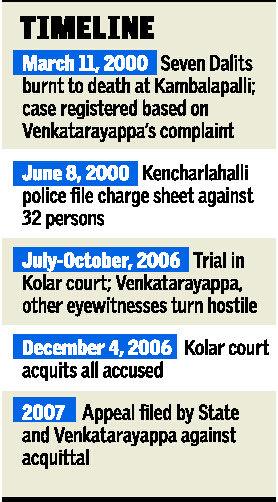
Upholds trial court’s order of acquitting all 32 accused
In a setback to the prosecution, the High Court of Karnataka on Thursday rejected the State’s plea to conduct a retrial in the Kambalapalli Dalit carnage case. On March 11, 2000, seven Dalits were burnt to death at Kambalapalli village of Chintamani taluk in Kolar as a result of a feud between caste Hindus and Dalits.
A Division Bench comprising Justice Mohan M. Shantanagoudar and Justice C.R. Kumaraswamy dismissed two appeals — one filed by the State and another by Venkatarayappa, who lost four family members in the incident — questioning the December 4, 2006, order of the sessions court in Kolar.
The sessions court had acquitted all 32 accused after key witnesses, including Venkatarayappa — who lost his wife Ramakka, two sons Ramappa and Anjanappa, and daughter Papamma in the incident — turned hostile. All eyewitnesses told the court that “they had not seen who set the houses on fire and how the victims died.”
It was alleged that a group of 60 to 70 persons belonging to the Reddy community locked the victims inside Venkatarayappa’s house and set it on fire after pouring petrol and kerosene.
Narasimhappa, Kunti Papanna, relatives of Venkatarayappa, and Subbamma who was in the adjacent house, were the others who died in the incident.
‘No use of retrial’
The Bench said, “We are unable to accept the contention of the State that the matter needs to be retried because many witnesses were not examined… 25 eyewitnesses were cited in the charge sheet and 22 were examined; the remaining three died during trail. All the witnesses examined for the purpose of proving the aspect of recovery of weapons at the instance of the accused turned hostile,” it said.
Also, the Bench observed that “the witnesses for all the inquest panchanamas, except the official witness, have turned hostile. Hence, we are of the opinion that no useful purpose will be served even if an opportunity is given to the prosecution witnesses to lead further evidence.” No valid grounds were forthcoming to permit the prosecution to lead further evidence, the Bench said, while pointing out that the court cannot come to the aid of the prosecution by giving opportunity for recording the additional evidence merely because certain “unimportant witnesses” were not examined.
Additional evidence cannot be permitted as per the whims and fancies of the prosecution, the court said.
(The Hindu)


